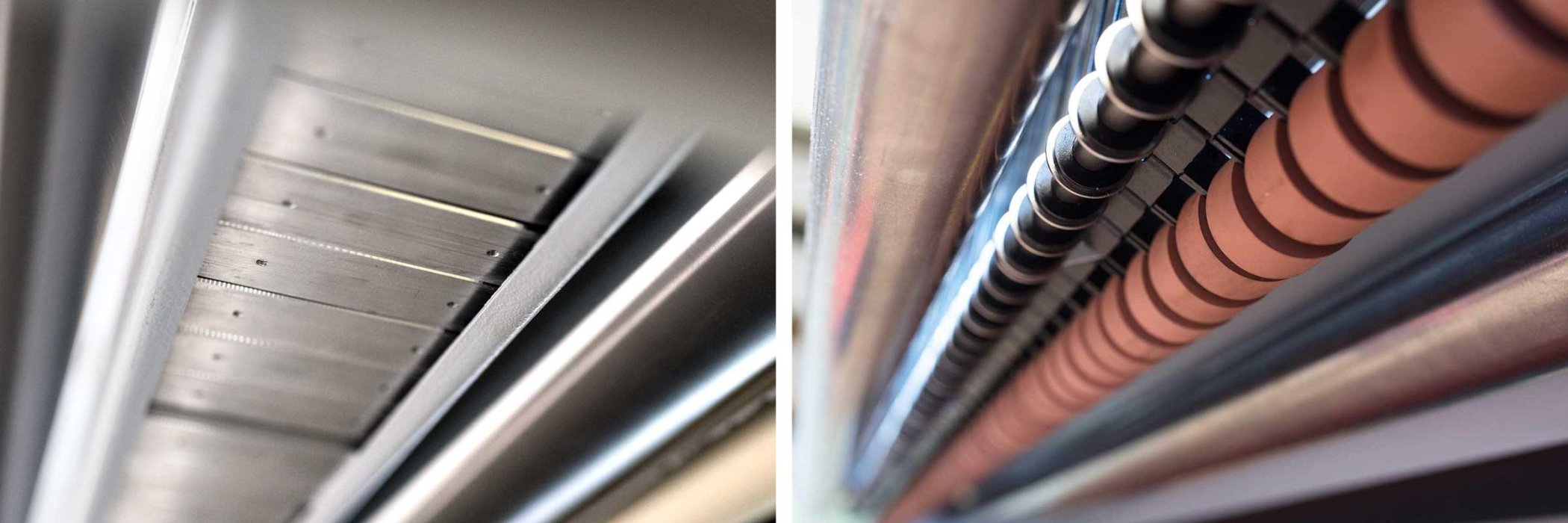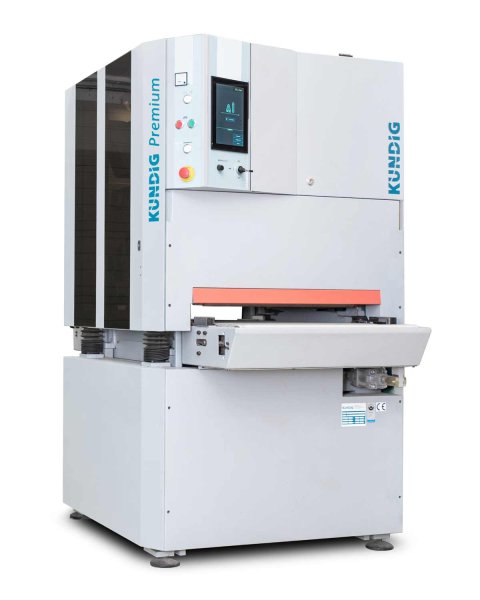Vmax
Kündig Technic Vmax sanders are for applications where requirements regarding surface quality are high, especially when it comes to window frame production. Two symmetrically arranged oblique sanding units forming the shape of a "V" generate what could be described as an oblique cross-sanding procedure.

Frame-by-Frame Window Production
Kündig offers a specialised model for window production, the "Vmax". Two symmetrically arranged oblique sanding units forming the shape of a "V" allow the elimination of sanding traces on window sashes with long and cross-grain sections. The combined oblique units generate what could be described as some sort of oblique cross-sanding. This allows for assembled window frames to be sanded using the whole working width, reducing vibrations on the frame and ensuring great surface quality. Slight rotating of the frame in order to avoid vibrations is not required thanks to the double sanding technology, hence saving precious working width. Thanks to the dual shearing cut with differing angles, approximately 90% of fibres can be cut off. Intermediate sanding with water based lacquers takes noticeably less time, or under favourable circumstances, can even be omitted completely. Thus providing significant cost saving potential.
The Kündig Technic-2 1600-RdEd Vmax is equipped with an oblique roller unit and an oblique, electronically controlled, segmented pad. These units are arranged +10°/-10° and create the shape of a "V". This allows for assembled window frames to be sanded using the whole working width, reducing vibrations on the frame and ensuring great surface quality on cross and long grain sections of window frames.

Advantages of the Dual-Oblique-Technology
- Thanks to the oblique sanding unit, the frame can be inserted straight into the machine without generating a great deal of vibrations. Slight rotating of the frame is not required, hence precious working width is saved.
- The oblique unit doesn't "crash" with the cross grained part of the window frame all at once. Therefore no vibrations are generated on the frame.
- Thanks to the "shearing cut", fibers are being cut off much more efficiently, hence greatly reducing effort in intermediate sanding.
- Cross grain sanding traces are almost non existent. The oblique sanding technology makes them vanish on the workpiece. This results in much finer, more homogeneous surfaces compared to the results of other sanding technologies.
- Sanding belts are much less prone to clogging when used on resinous wood, therefore belt lifetime is significantly improved.
Diagonal Sanding Units
Kündig Brilliant sanders have at least one oblique sanding unit. With traditional, parallel sanding units, even after short use, sanding belts show small damages, grit outbreaks and irregularities due to wear and clogging. These imperfections negatively affect the sanding image, particularly on delicate surfaces like lacquer or veneer. This inherent flaw of the parallel sanding process can be avoided by pivoting the sanding unit by 10°. Further advantages are absence of oscillation marks, extended life of sanding belt due to this error tolerant procedure and significantly better sanding quality. For lacquer and veneer applications this technology is ground-breaking, but its great advantages are also very visible in window production or fine solid timber work.
Oblique sanding units are available as calibration rollers, pneumatic pads, electronically controlled segmented pads and combined solutions and offer the usual durability and reliability of Kündig products. They can be combined with our high gloss cross-belt unit, brush units and all the available dust removing devices.
| Calibration Roller Rd | Calibration Roller Gd | Pneumatic Pad Pd | Segmented Pad Ed | Combi Unit Kd | Combi Unit Cd |
|---|---|---|---|---|---|

|

|

|

|

|

|
| Calibration Roller diagonal | Large Calibration Roller diagonal | Pneumatic Sanding Pad diagonal | Electronically controlled segmented Pad diagonal | Combi Unit featuring Calibration Roller and pneumatic Pad | Combi Unit featuring Calibration Roller and segmented Pad |
Working Widths
| 1100mm | 1350mm | 1600mm | 1900mm | 2200mm | Other working widths on request |
Which configuration makes most sense in your case?
Sanding Pads

Pneumatic Pad
Well proven sanding pad technology, especially for solid timber processing. A continuous air cell provides even pressure on the workpiece.
Segmented pad
The segmented pad is divided in segments either 35 or 22 mm wide. These segments are computer controlled and preferences can easily and thoroughly be adjusted by the operator. The electronically controlled, segmented pad is especially useful for taking care of those delicate workpiece edges on lacquered or veneered parts.
Pad options
Segments and therefore the sensing rollers at the machine entry are available in 35 or 22mm width. Depending on the material that needs to be sanded, a variety of sanding shoe hardnesses are available. Two different hardness shoes are included from the factory.

Individual Parts Production
Production and processing of individual parts before assembling the window frames are a very common method. Despite state of the art planing technology, customer demands regarding coating quality often can't be met anymore when surfaces are just planed. That's where sanding comes in. The sander is usually found directly after the CNC machining center.
Integrable
For single parts production, our Vmax technology is usually not necessary. The Premium series of machines are characterised by the classic parallel unit layout. The Kündig Premium-2 650-RP is a great example for a well proven solution, which is also easy to integrate into existing production lines. In Kündig sanders, only the upper section moves for height adjustment. The result is a fixed working height. There are many advantages to this philosophy. One of them is that machines with a fixed working height can effortlessly be combined with other machines in a production line. Also the Premium-2 650-RP is very compact and barely takes up any space.